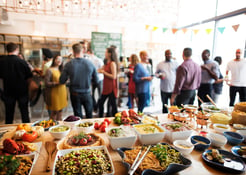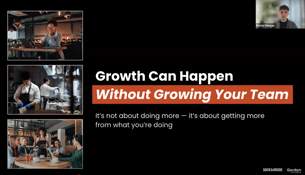Having a strong digital presence is absolutely critical in today’s restaurant business. With more than 1 billion users on TikTok, 2.5 billion on Instagram, and nearly 3 billion on Facebook, chances are good that your audience is spending time online.
This makes social media marketing absolutely vital to your restaurant’s visibility, reach, brand identity, and audience engagement. But effective social media marketing for restaurants requires thoughtful planning, nimble execution, and a serious investment of time and energy.
10 Tips for Restaurant Social Media Marketing
It's not easy to figure out how to approach social media for your restaurant, and a strategy of simply copying your competitors won't get you far. Instead, consider these helpful tips for your restaurant social media marketing to ensure that you're able to master your digital marketing efforts.
1. Choose a full mix of social media platforms
Struggling to choose between Facebook, Instagram, TikTok, and LinkedIn? Don't feel pressure to show up on all of them. Your social media marketing strategy should cast a wide net, but also tailor your strategy to where your target audience most likely "hangs out".
If you want to put time and effort into Facebook, you can think of it as an extension of your restaurant's website. Your profile should be packed with essential information including your restaurant bio, profile pic, menu, hours, physical address, website link, and buttons for takeout orders and dine-in reservations where applicable.
LinkedIn, on the other hand, is primarily a platform for businesses to connect with other businesses, so you might not want to put as much time, effort, or resources into building out content there. The exception? You run a catering business and you know you'll find your target audience on that platform.
2. Post good food and drink photos
Good food photography can drive social media marketing for restaurants. Bad food photography can crush your sales.
Showcasing your restaurant's dishes and drinks is a tried-and-true method for building a following and converting those followers into paying customers. But your food photos must be excellent!
Crisp, fresh, high-resolution food photos can draw online users to your restaurant. Low-resolution food photos can give social media users a less-than-savory impression of your establishment. If you’re not sure you can capture the true beauty of your menu on your own, we would strongly advise scheduling a session with a professional food photographer.
3. Offer a peek behind the scenes
Find the balance between slick, professional photos and more personal visual content. Social media marketing for restaurants should include at least a glimpse behind the curtain.
Livestream a cooking demo directly from your kitchen on Facebook. Create an Instagram story documenting the lunch rush at your restaurant. Take TikTok followers on a rapid-fire tour of the local farm where you source your fresh produce. Keep it short, keep it simple, and - most importantly - keep it real.
4. Encourage user-generated content
User-generated content is an effective and organic way to promote your restaurant and engage your followers. Make sure your notifications are turned on, and that you receive an alert every time your restaurant is mentioned in a user post or comment. Be prepared to share and respond.
When someone posts about your restaurant, and you subsequently share that post on Facebook or Instagram, you are providing living proof that other people love your restaurant. You’re also demonstrating your appreciation to the original poster, which encourages customer loyalty and future engagement.
Think of user-generated content as free social media marketing for your restaurant with the added benefit of total authenticity.
5. Stay on top of trending topics
Every social media outlet has its own way of casting the spotlight on “trending” topics. Jumping into a trending conversation is a great way to improve visibility and engagement. But only jump in if it's a topic that makes sense for your brand, holds interest for your audience, or gives you an opportunity to share a unique perspective.
Also be sure you understand why a topic is trending before you jump in! Avoid engaging potentially controversial or inflammatory topics. The point of social media marketing for restaurants is to make new customers; not win arguments. It’s generally a good idea to stay in your lane.
6. Hold social media contests
Contests are a great way to gain a bunch of followers really fast. Deciding on a new menu item? Put it to a vote by creating a poll on Facebook. Or use one of Instagram’s “Polls”, “Quizzes” or “Questions” features to run a few fun, informal contests.
Offer free restaurant swag to your winners and encourage multiple entries. Give followers reasons to check in and engage. Truly effective social media marketing for restaurants will make customers feel like they have a stake in the brand.
7. Spotlight your team members
A restaurant is only as good as its staff. Shining a spotlight on your restaurant's diverse and inclusive team is an effective way to communicate your restaurant’s values. And showing that your restaurant is run by actual humans can add more depth and character to your online identity.
Consider publishing mini-profiles of standout team members (with their permission, of course). Include a photo, a brief biography, and a few fun facts. In addition to creating a more personal experience for your social media followers, this initiative can be a morale booster for your personnel.
8. Consult analytical insights to improve engagement
Each social media platform demands its own approach to engagement. Effective social media marketing for restaurants may vary slightly from one platform to the next. It’s up to you to find the right cadence and frequency for posting on each platform, as well as the best hours and days to post certain types of content.
To do this effectively, consider leveraging analytical insights on the performance of your own posts as well as the performance of industry competitors. These insights can help you to better understand your audience’s behavior.
You may wish to enlist the services of a third-party provider for support. There are several reputable scheduling and analytics platforms that can offer a deep quantitative dive into the behaviors of your audience base.
These tools can help you optimize the pace, frequency, and scheduling of your social media posts in order to draw the best possible response from your audience.
9. Engage all feedback, even the negative stuff
Of course, you always want to show your appreciation for positive feedback with a timely and friendly response. But the very same goes for negative comments. Whether your restaurant receives a negative review on Yelp or a less-than-complimentary comment on an Instagram post, you should respond just as swiftly and just as respectfully.
Be open to feedback and take your customer’s concerns seriously. This can be a great way to turn a negative experience into a positive one. You can’t please everybody, and social media engagement inevitably opens you up to the possibility of negative engagement. Always remain positive, friendly, and fully prepared to take this engagement head-on.
10. Establish a consistent tone and voice
Whether your restaurant’s brand voice is playful or direct or whether you focus on vibrant food photography or reels from behind the scenes, your goal should be to establish brand consistency. This means that the look of your profile, the tone of your posts, and the voice you use to engage customers should all align with your physical brand.
This brand consistency should also extend across all of your social media platforms. As an article from Forbes notes, “when your content quality, quantity or schedule isn’t consistent, it can confuse your customers. Keeping with a regular strategy not only helps create a better customer experience but it also helps build credibility, reputation and brand trust.”
Keep the content fresh and interesting. But be sure that everything fits under the visual and rhetorical identity you’ve worked to establish online.
Leading Providers of Social Media Marketing For Restaurants
Building and managing a social media marketing presence is vital to your restaurant’s online visibility. But doing this effectively takes time, effort, and expertise.
Fortunately, there are plenty of excellent social media management providers that can help. Check out our ranking of the very best social media marketing services available today and find the right provider for your needs.
[Photo: ready made from Pexels]





